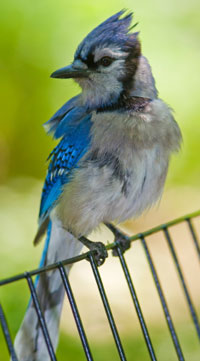Tiny Mosquito
West Nile Virus Birds
Most people know that West Nile Virus is carried by mosquitoes. A mosquito becomes infected with the virus from biting a contaminated bird. Although humans cannot catch the West Nile virus from a bird, as a precaution, it is imperative that people do not handle birds or other sick or dead animals with their bare hands as they may be infected with the disease.
What to Do
 With the outbreak of West Nile virus, birds found dead are of significant
concern. If a dead bird is discovered on or around your property, use
heavy-dut, leak-proof rubber gloves to carefully place the bird in a double
plastic bag, ensuring that no part of the bird or its feces, blood or
secretions comes into contact with your skin or clothing. You can also
use a shovel or wrap an inverted plastic bag around your hand to pick
up the bird while drawing the top of the bag over it. Gentle handling
is important so the beak or claws do not puncture the bag. Thereafter,
place the bird in an outdoor trash bin and be sure to wash your hands
thoroughly with soap and water.
With the outbreak of West Nile virus, birds found dead are of significant
concern. If a dead bird is discovered on or around your property, use
heavy-dut, leak-proof rubber gloves to carefully place the bird in a double
plastic bag, ensuring that no part of the bird or its feces, blood or
secretions comes into contact with your skin or clothing. You can also
use a shovel or wrap an inverted plastic bag around your hand to pick
up the bird while drawing the top of the bag over it. Gentle handling
is important so the beak or claws do not puncture the bag. Thereafter,
place the bird in an outdoor trash bin and be sure to wash your hands
thoroughly with soap and water.
Which Birds
When it comes to the West Nile Virus, birds such as the blue jay
and the crow are the prevalent carriers, although the
disease has been found in 175 other varieties of birds
in North America. Most birds do not show signs of illness when they are
infected with West Nile virus. If you notice a freshly dead crow or blue
jay in an area where the presence of West Nile virus is known, double
bag the bird and call your local or state health department to report
it (under government listings in your telephone book). It is recommended
that you put the bagged bird on ice or in a freezer to prevent it from
deteriorating before it is picked up. A rotten carcass cannot be submitted
for testing for West Nile virus.
Calling for Pick-Up
When placing a call to your local or state health department for the pick-up
of a dead or sick bird, be sure to provide the following information:
- Your full name and telephone number
- The exact location of the bird
- The species of the bird, if known
- The bird’s condition (still alive or dead) and specific characteristics of its appearance
However, if the area is already known to contain West Nile Virus, birds may not need to be picked up for testing and you might be asked to dispose of the bird yourself.
Home - Mosquitoes - Bites - Control - Diseases - Resources - Site Map